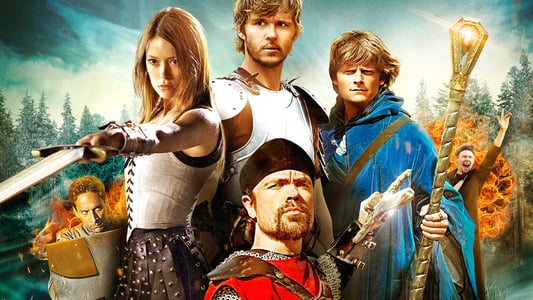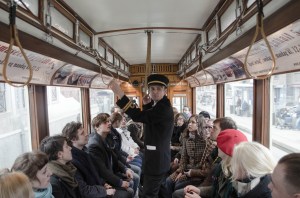LARP and Society: Changing Perspectives on ‘Geek Culture’
‘All the world’s a stage / and all the men and women merely players / They have their exits and their entrances / and one man in his time plays many parts.’ – As You Like It (Act II Scene VII), William Shakespeare.
Live Action Role Play (LARP or LRP for short) is a hobby that has grown exponentially across the globe in recent years. But what exactly is it? A form of RPG (role-playing game) in which the participants physically act and dress-up as their characters, it is a game where the mechanics of a pen and paper RPG are dragged from the table and placed out into the ‘real’ world. Interestingly, LARP is a game with no single point of origin, starting off in the 1970s and 1980s across parts of North America, Europe and Australia. Yet, it is also a hobby that can arguably trace its roots back to 16th century Italian improvisational theatre, known as Commedia dell’arte. Highlighted in recent articles on the role of women in RPG’s and LARP and in a collection of essays on ‘Gaming as Culture’, the commonality between LARP and Commedia dell’arte is an intriguing one. As one essay on ‘Playing with Identity’ notes:
“[LARP] brings role-playing even closer to modes of performance [like Commedia dell’arte] (…) Both are improvised, created by players on the spot. There are no scripts, though there are stock characters and situations that appear in different combinations.” (Nephew 133)
With this in mind, this commonality suggests that despite being irrevocably linked to ‘geek culture’, LARP is in fact a practice that has been inhabiting society for centuries. Of course you’d be forgiven for thinking that this was a hobby overpopulated by stereo-typically geeky, middle-aged men running about as wizards. Unfortunately, media inclusion of this hobby in films like Knights of Badassdom and Role Models don’t exactly do much to project away from this perceived image, often playing it out for laughs to the detriment of those trying to get involved.

Yet in today’s society much has been done to reclaim and popularise facets of ‘geek culture’ to the wider masses, the most obvious example being RPG games like Dungeons and Dragons. Shows like Stranger Things, and podcasts like The Adventure Zone, Critical Role, and High Rollers are amongst those shows which aim to make a once insular, ‘nerdy’ hobby more accessible. Yet with depictions of things like LARP, the media still has some way to go. Why is it that running around in costume, inhabiting the world of your character, is viewed with mild amusement or confusion, versus other hobbies like acting, for example? The spurious view that LARP is a hobby inhabited by awkward nerds who prefer a computer and to be indoors is a thankfully eroding one. Of course, in some ways, it can be – but that is definitely not all this hobby is. Is it nerdy? Perhaps. Is there more to be gleaned from it? As with most things, definitely.
A form of escapism, or a tool for societal change?
So, why the stigma? As an interesting and diverse pastime, why do people find the concept of dressing up and playing a role in a game less socially acceptable than, say, participating in sports or acting on stage? LARP is not just a game that revolves around a fantasy psuedo-medieval setting (although it is one that is understandably highly popular), but a hobby that invites a whole host of different settings and game plot. Recent articles in The Guardian and The Spectator have explored this hobby as one which can act as a tool of societal change or as a means to fully engage and learn more about other cultural avenues such as art or history.

Importantly, and crucial to this discussion, LARP is also a game which can enable a sheer, raw depth of emotion, ideal for fostering empathy and exploring sensitive issues like gender identity, racial discrimination, and systematic injustices. A form of interactive story-telling, LARP is a useful outlet for navigating and learning about these issues; a game which can therefore not just be fun, but insightful too. Of course, obvious contention can come from questions like “how can you play at being oppressed?” However, the main goal of a lot of LARPs which seek to explore this (like The Tribunal; a Nordic LARP – a particular subset of the hobby – where the players are the jury for two soldiers, set in under a totalitarian regime), is that it is important for people to learn about and connect with situations which they might not experience in order to understand them better. Simply, LARP can make one connect with otherwise difficult to process experiences through emotional empathy; termed by some as a sort of ‘experimental anthropology’.
Yet, this is a hobby that brings with it emotional lows as well as highs, as this article about LARP exploring social change goes onto explore. Whilst LARP can foster safe spaces through which to explore sensitive topics, or indeed, simply act as a place to throw oneself into an emotionally intense narrative, it can quite often cause its players to experience forms of extreme emotional catharsis, sometimes leading to ‘post-larp depression’ or ‘event drop’. The immersion and ‘emotional bleed’ can feel deflating, transitioning between being their character and returning to real life. However, there are lots of support networks in place to cope with this – usually on online forums or regular meet-up groups, organised to talk about the events of the game.
As such, LARP as a hobby can be an intensely immersive, emotional game; but it can also be a lot of fun too. It is a game which allows for a broad scope of settings, plots, and characters, often giving people the opportunity to both escape from real life into a new and fantastical (or sci-fi, cyberpunk, zombie apocalypse, Big-Brother like) land, or learn more about different social situations in more ‘modern’ settings.
LARP and Meritocracy
Another part of the hobby that is also intriguing is the place of women and non-binary individuals, in an otherwise largely masculine dominated game. As a game that largely prides itself on being a meritocratic one, this is a hobby where the notion of sexism and gender discrimination is quashed – a refreshing sentiment to experience and entertain as part of a game set-up. For example, Empire (run by organisers Profound Decisions) state that their game is one which is ‘gender blind’ – and whilst the setting does include discrimination as an active part of the world (such as inter-nation or archetype conflicts), the idea that typically masculine or feminine roles are assigned to any particular gender is one that should “be seen as ridiculous by any normal character.”

But the hobby isn’t perfect. Whilst LARP is in essence a meritocratic game, where the abilities of players are not dependent on their gender but simply based on the abilities they choose and their roleplay, discrimination and sexism still occur. One example being, as one article briefly mentions, in spaces where combat and military leadership are discussed. However, encouragingly, LARP is also a place which allows for individuals to not only dress up as male or female, but to actively explore and challenge female and male stereotypes as an inclusive and openly accepted part of the hobby.
From this perspective, one can view LARP as a game that promotes tolerance and individuality; a space to both have fun, but also to learn from others. In LARP, the world is quite literally your playground. It only remains for those who find themselves in these worlds to explore.
What do you think? Leave a comment.











I’m 29 and have never done any of these events, but they look real fun.
I am enthused by this new breed of gaming! It’s as if someone has made my dreams (nightmares?) come true!!!! I vow to get involved in one o f these games soon!!!!
I participated a year ago in a LARP in which I played a refugee during a future environmental crisis, desperately seeking access to a gated and armed community. It was a powerful experience for all the players, who had to heavily debrief their reactions to the dilemma the game created. It may not be a forum for changing minds, but it’s a great forum for critical, ethical self-reflection.
This is not new, people role play for training purposes in workplaces all the time.
Did you win?
Some people are so good at larping they make the otherone forget it and consider it a relationship.
I used to spend weekends in the late 80s ‘monstering’ – playing monsters for live role players to ‘slay’ in various outdoor venues. Used to get paid for it too…. Great fun!
It sounds fun! We don’t often get a chance to play, once we’re grown up. Shame, really.
There’s lots of LARP games. Pick your genre and pick what sort of character you would like to play. It’s enormous fun.
Yes it is fun and also can be powerful as an experience.
This sounds great. Shame nothing this cool ever comes to Belfast.
There’s an interesting scene in the US taking place which focuses more on the gameplay aspect instead of the performance/entertainment experience. Jericho for example is a spy game in San Francisco that arms players with laser tag guns and hi-tech spy gadgets and puts them on missions that use the entire city as a battleground. Also more universities are starting to see students playing week long games of Humans versus Zombies, where all you need is a Nerf gun and some socks to fight off the hordes, until you become a zombie, which is usually inevitable.
There’s definitely a similar scene in the UK – Fire Hazard are a great example, but there are dozens of others. I tend to focus more on the performative side because that’s how we started out, through the live gaming scene in Norwich, but London & Bristol especially seem to have big gameplay-focused groups doing awesome things. Lots of overlap, of course.
I tried a LARP recently. Best laugh I’ve had for years.
The article should also mention the government’s new initiative to let us play theme hospital for real. It is really easy to get involved with – as long as you went to school with a member of the cabinet, you don’t need any prior experience before they let you loose on a real hospital.
The one difference with LARPing and real life is that those taking part know that they’ll be returning to their lives once the game is over.
Some people will take this deathly seriously, some people will have a laugh and some will not put much in and not get much out. Just like life.
I would never have the patience to engage in LARP.
I’m too old for all this. It sounds bizarre to me. I’d rather go mountain climbing. 🙂
I play the live-action version of FIFA 13 on most weekends. I must admit though, the difficulty level is set to “amateur” rather than “world class”.
Role-playing need not be progressive.
Interesting concept though the LARP thing always reminds me of people running around with stick on ears shouting thunderbolt.
Great discussion and really interesting how much this has become a relatively accepted form of expression. I always find it amusing though that people don’t realise that the civil war recreationists are LARPers.
Nice work! If you wanted to do a follow-up, I’d definitely like to know more about eradicating the stigma around geek culture, LARP, etc. For instance, if it were up to me, I’d be a full-out Harry Potter/Once Upon a Time geek decked out in Ravenclaw wear and drinking my cocoa from an apple-shaped mug. But, “You’re 32 years old, you’re an adult, why are you doing that, blah, blah.” It really gets on my nerves, because like, it’s not as if that’s my entire life. And really, how is that any different from geeking out over “adult” books or posting TV-related memes on FB?
Anyway, again, loved the article and would like to see more.
Great story! I could read a whole other essay about support groups for post-LARP depression. It feels like uncharted territory and a whole new world for psychology to explore. I’d love to read interviews with some of the recovering people as well. So much great research here!
For me this story is quite enough good because in this story some scenes are already taken in my mind but i appreciate your work perfect thumbs up.
I would suggest writing more on this interesting topic. Perhaps adding more examples of how other games have tried eliminating stereotypes.
I’ve recently started playing D&D after many years of just hearing about it, so I can understand this normalization and interest in diving into geek culture more. Although I would describe myself as a video game geek, the deeper echelons of my nerdiness had never reached D&D. With that in mind, there is a local LARPing event that is being held this summer, and my curiosity has been piqued, even more so from this read.
I think that games, in general, have this ability to unite people in a world which they deem safe and interesting. It is a way for them to explore, as the article states, but more than that. It is permission for them to experiment with things that they might never feel in real life and learn from them. This is where the strength of games is and how it can lead to changes.
This post makes me nostalgic for my introduction into the world of LARPing. I was performing Macbeth in costume with weapons and everything on my high school’s soccer field for my AP Comp class. Some of my friends were chanting, “LARP, LARP, LARP!” so I learned what LARP meant and shortly after, joined my college’s LARP club. It’s nice to know that “geek culture” is expanding and becoming more accepted. I personally was not ostracized or bullied for my love of it, and truthfully, I’ll never understand people’s need to see us as lower than them on the social ladder.
Great article, I love that larpers have been able to enjoy their craft despite the stigma hope it goes away someday.
Very interesting article! I hadn’t thought about LARP as a path to practice and develop empathy, perspective-taking, and even self-exploration, but it does certaintly seem to be a great (and fun!) tool toward these ends.